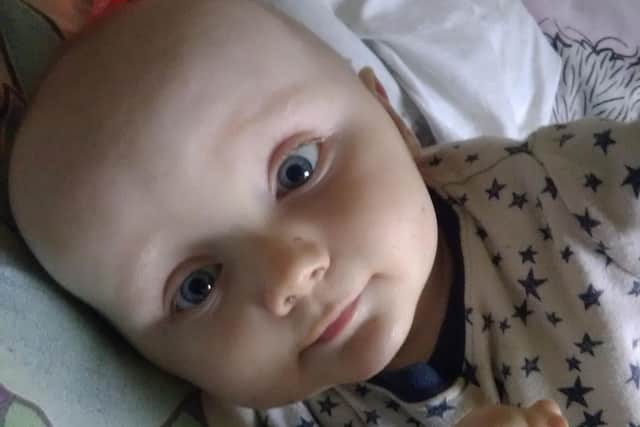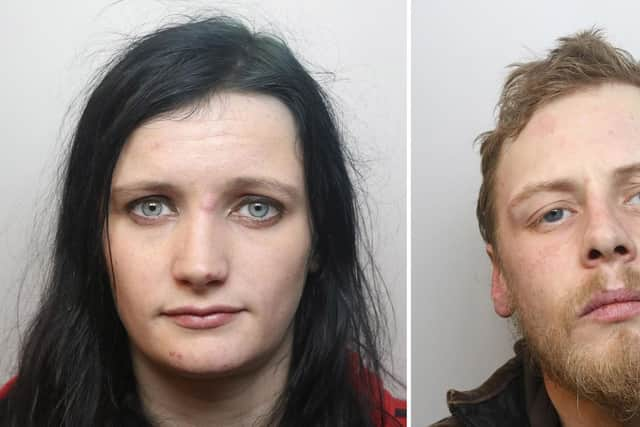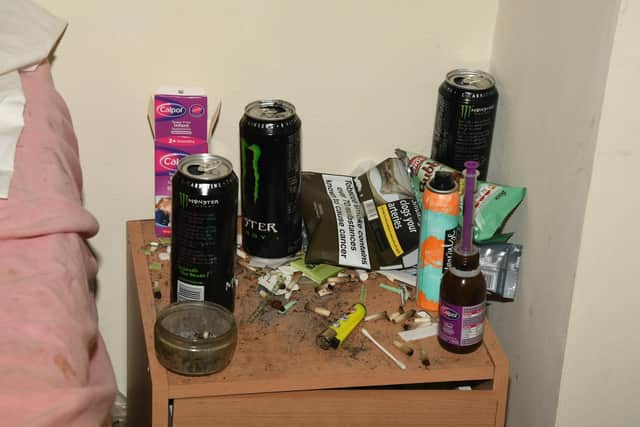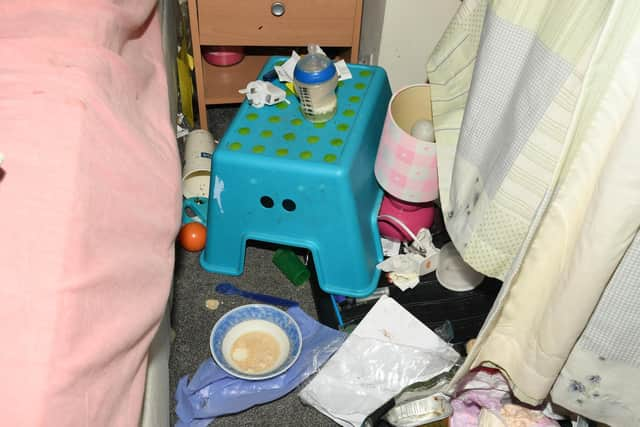Finley Boden: Child safeguarding review shows how Covid and “optimistic” assessments allowed baby back into “sadistic” parents’ care
and live on Freeview channel 276
The Local Child Safeguarding Practice Review found 10-month-old Finley’s parents Shannon Marsden and Stephen Boden “were known to have posed a risk of significant harm” to Finley and “professional interventions should have protected him”.
Finley died on Christmas Day 2020 after suffering 130 injuries – including 57 fractures and burns – just 39 days after being returned from social care to his “sadistic” parents. The baby, taken into care at birth, died just 39 days after he was returned to his cannabis-smoking parents’ care. They were both jailed for life for his murder last year.
Advertisement
Hide AdAdvertisement
Hide AdA report into the circumstances leading up to Finley’s return to the couple and the last weeks of his life while living with them, has highlighted how professionals such as social workers, drugs workers and others were not engaged properly in decisions over Finley’s return to Boden and Marsden. It adds that Covid provided the perfect opportunity to exploit weakness in the system and hide their inability to parent Finley.


Key findings
- Report authors say Boden and Marsden “were known to have posed a risk of significant harm” to Finley and “professional interventions should have protected him”.
- Safeguarding safeguarding practice during the last few weeks of Finley’s life was “inadequate”.


- Social worker assessments of Boden and Marsden relied heavily on “self-reporting”.
Advertisement
Hide AdAdvertisement
Hide Ad- Too much weight given to the couple’s intention to reduced cannabis use and lacked an “objective evaluation”.
- The social care assessment contained of the couple “optimistic conclusions” about the couple and did not include the “active participation of multi-agency partners”.
- Copies of the assessment were not shared with partners. Partners, however, did not challenge this, which suggests that not sharing was “common practice”.


- There was no communication between substance misuse services and children’s social care. Boden’s substance and drugs worker was not invited to participate in child protection planning. As a result key information was not shared with safeguarding partners.
Advertisement
Hide AdAdvertisement
Hide Ad- Neither Boden nor Marsden, nor partner agencies played an active part in planning for Finley’s return. The couple did not receive a “comprehensive and coordinated package of support”. Professionals working with the family were not consulted prior to the proposal for Finley to be returned to the couple was put to the court.
- Once Finley had been returned to his parents, because the risks were poorly understood, practitioners and managers were badly informed about the risk that he might experience harm. This was made worse by the absence of regular practical support to parents which limited the opportunities to identify early signs of deterioration.


Covid and resulting casework failings
The report found that when lockdown measures were introduced, as care proceedings regarding Finley’s future care were ongoing, they created perfect conditions for Boden and Marsden to deceive care professionals.
Child protection conferences were held virtually, with parents joining through mobile phones.
Advertisement
Hide AdAdvertisement
Hide AdHeavy cannabis smoker Boden was not living with Finley at this point and so his cannabis use was deemed “low risk”, with appointments conducted by telephone. This enabled him to “self-report” and drugs workers had “no ability to visually assess his presentation”.
Finley’s local authority guardian was shielding from the virus, meaning, even as restrictions reduced she was unable to return to in-person meetings.
The report states: “At what was a crucial point in planning for the children the myriad protective systems and services designed to detect, prevent and respond to maltreatment were severely disrupted as parents’ “self-reporting correspondingly increased”.


In-person attendance in family proceedings court was replaced by telephone attendance – with professionals attending by computer and parents relying on their mobile phones. The report commented: “The usual potential for discussion and negotiation within the court building was also eliminated.”
Advertisement
Hide AdAdvertisement
Hide AdBefore Finley was returned to his parents, responsibility for his case was allocated to a recently-qualified and “inexperienced” social worker who provided the court with an “inconclusive” assessment of Boden and Marsden’s capacity to care for Finley.
The social worker has since told one reviewer she was “uncertain” at the time about the requirements of a social work assessment, while guidance from managers was hard to come by.
When the worker went off sick for six weeks, just as local lockdowns were introduced, no social work visits took place and no child-in-need meetings were held, however casework responsibility remained in the absent social worker’s name.
Commenting on the above failings, the report reads: “The local authority acknowledges that, while the pandemic created unique pressures, more could have been done to work the case and to formulate the final care plan with partners.”
“Optimistic” care assessments of Boden and Marsden
Advertisement
Hide AdAdvertisement
Hide AdFollowing the sickness absence of the main social worker, an agency worker was allocated Finley’s case, conducting outdoor contact “support” sessions. She recommended Finley’s return to his parents’ care be phased over six months.
However, when the original worker returned from sickness leave she reported Boden and Marsden being “verbally abusive” and refusing her entry during an unannounced home visit.
In October 2020 a virtual final family court hearing was conducted in respect of Finley, by phone. Derbyshire County Council suggested a slow transition for Finley back into Boden and Marsden’s care following a “positive assessment” by the agency worker, who stated the pair had “engaged well with services and demonstrated their ability to meet all the needs of the children”. However report writers say the evidence to support that statement was “weak”.
Finley’s guardian suggested reducing the transition period back to Boden and Marsden from four months to eight weeks. After deliberation the court determined this was "reasonable and proportionate”.
Advertisement
Hide AdAdvertisement
Hide AdCrucially, no order was made by the court for drugs testing on the couple to continue, which Finley’s original social worker felt “removed a source of reliable information through which the local authority could monitor and challenge the couple’s drug use”.
Absence of multi-agency engagement
The report has identified significant failings in terms of the involvement of care professionals during and after the decision was taken to return Finley to Boden and Marsden.
It was Boden himself, says the report, who informed his drugs worker that the baby would imminently be returned to his care. Finley’s health visitor discovered the court’s decision only after being invited to a virtual strategy meeting.
During a child protection conference conducted five weeks into the transition – when Finley was already back in the couple’s care – there were several important absentees.
Advertisement
Hide AdAdvertisement
Hide AdMarsden was unable to participate due to “childcare” issues and there was no representation from substance misuse services. The couple’s housing association had not been informed of Finley’s move to their home and the his guardian was unaware that a conference was taking place.
The social work report to conference also reflected the optimistic views already presented to court by the agency worker – although it would not have been obvious to anyone reading the report, the children had not been seen in their parents’ care since the transition plan had begun. The social work report was endorsed by a manager.
Within the child protection plan which followed, the social work visiting schedule was set at a lower level of frequency than had been outlined in the transition plan. The report comments: “This suggests that a weekly visit by children’s social care was considered to be more than adequate.”
